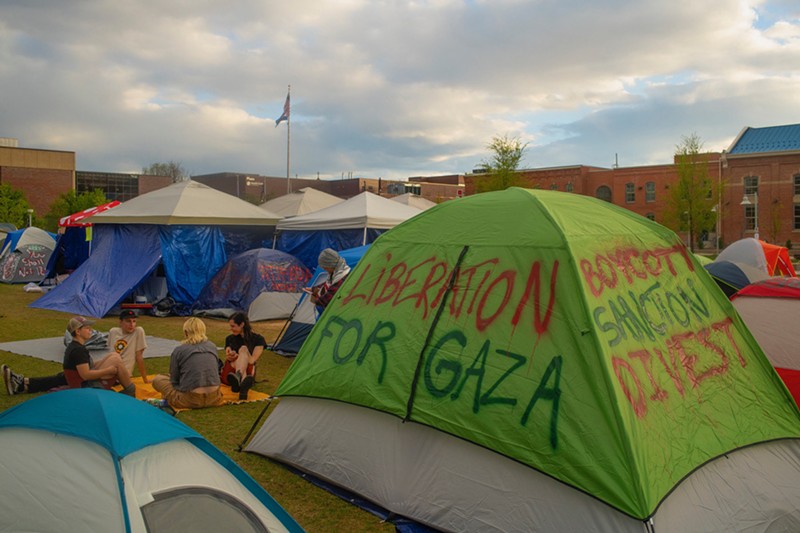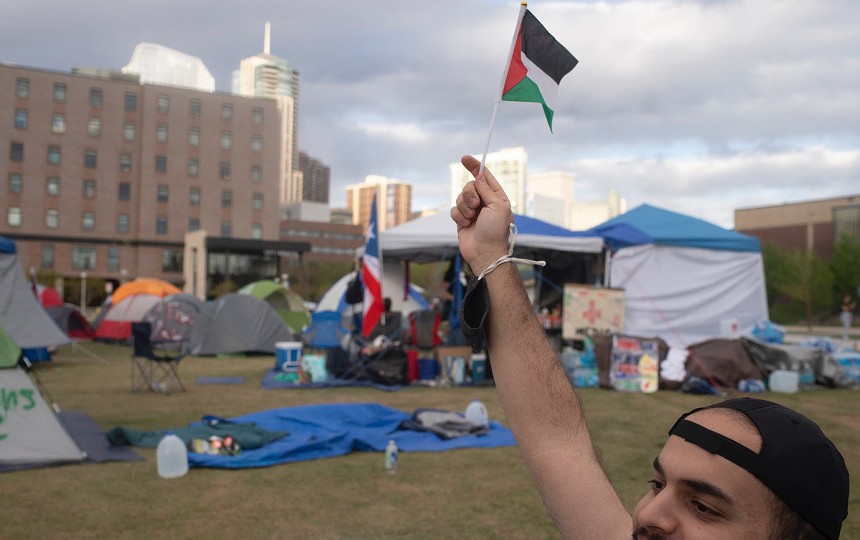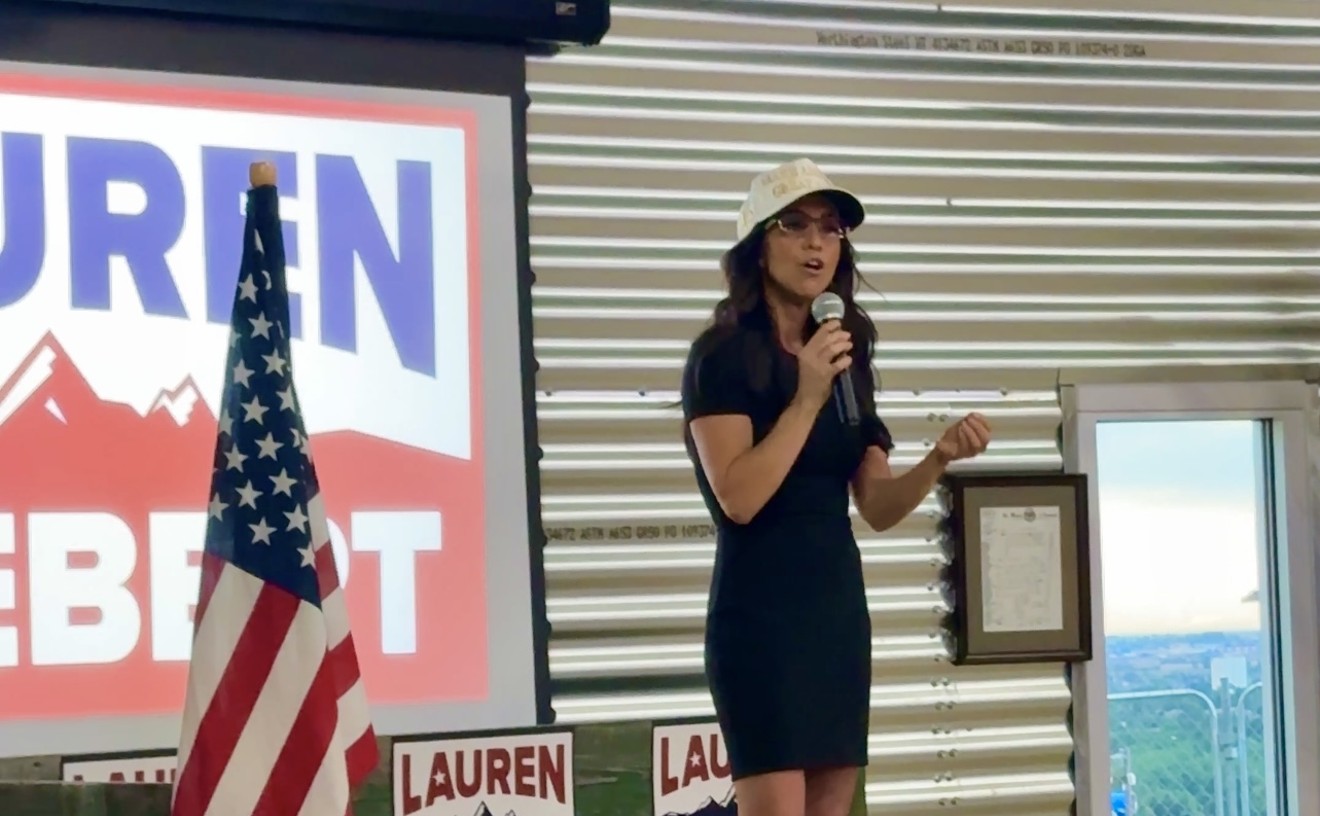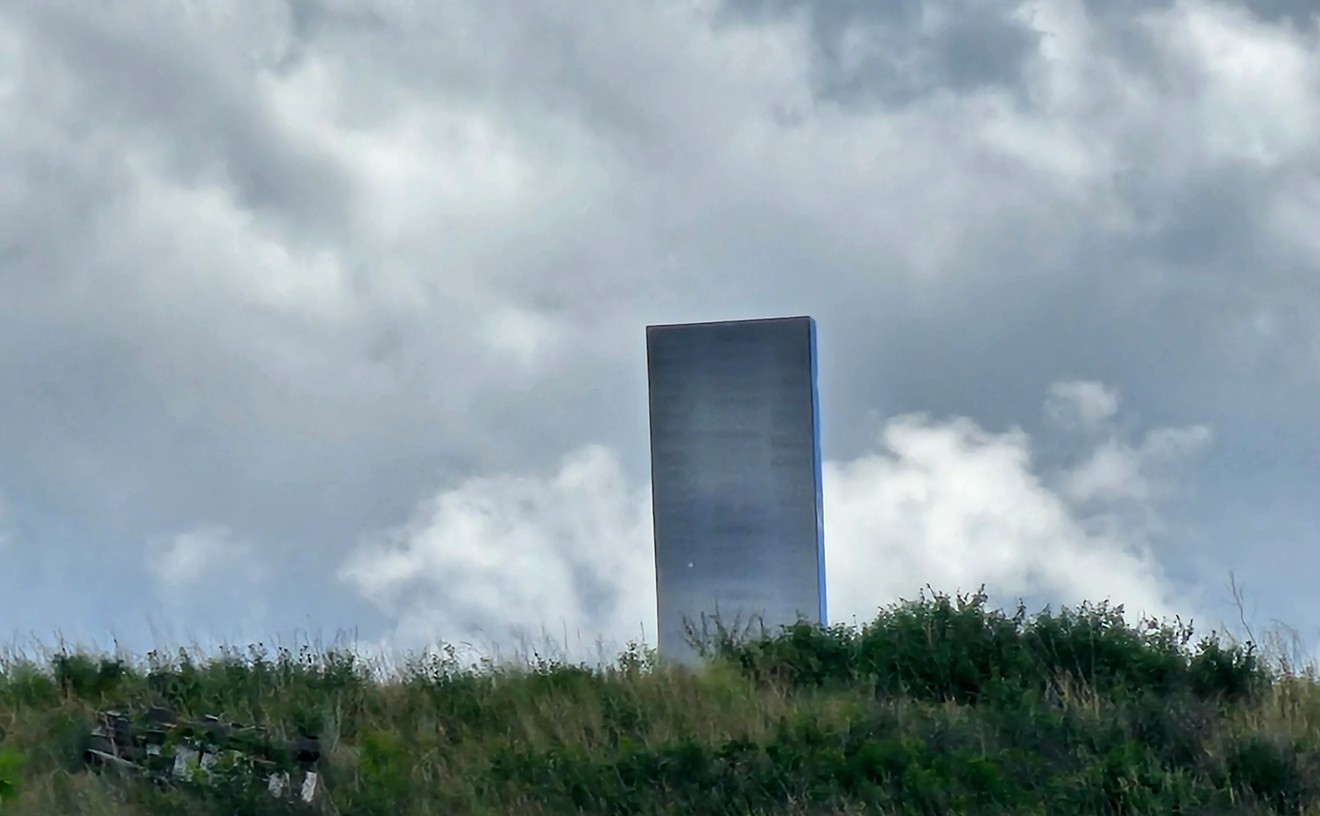For almost a week, students from the University of Colorado Denver and Metropolitan State University — two of the three schools housed at Auraria — have set up what they call a "solidarity encampment" for Gaza. At times the encampment has held over 1,000 protesters.
Students are protesting Israel’s aggressive and deadly military actions in response to a Hamas terrorist attack last October, but their main goal is achieving a set of demands from their universities: a published statement condemning the genocidal acts of Israel, the divesting of any corporations that operate in Israel, a full disclosure of their financial investments, the end of study abroad programs to Israel, and the future refusal of grants or funding from corporations that contract with the United States Armed Forces.
The Auraria encampment is being organized by the campus chapter of Students for a Democratic Society, a national college organization that helps students organize for progressive causes. The goal is to create a financial impact on Israel by joining other student protest encampments across the country, in hopes of convincing the Israeli government to end its military campaign in Palestine.
“We understand that a single university divesting from Israel is not going to single-handedly end the genocide of the Palestinian people, but we think that if two universities divest, [then] three, five, ten, twenty, fifty, a hundred, that's blow after blow after blow against this genocidal system of apartheid in Israel,” CU Denver student Harriet Falconetti said at a media gathering on May 1. “We think that's a very key aspect of ending that genocide.”
Students are upset that the University of Colorado’s aerospace program, located in Boulder, partners with weapons manufacturer Lockheed Martin.
“Lockheed Martin is a weapons manufacturer that is supplying weapons to Israel, and we know that those weapons are being used on Palestinian people," MSU student Lucia Feast said. “We do not want our money going to those weapons.”
Students from both schools want a full financial disclosure from their universities to determine what other companies they are involved with that could be contributing to the genocide. Federal data show the University of Colorado has accepted payments from the government of Israel or companies based there since 2016, with the most recent donation of over $500,000 in 2022.
CU Denver doesn’t have any study abroad programs in Israel, but MSU has an affiliate program that allows students to study in the country. According to Feast, school leadership has said they don’t control those programs.
“But we know that if they're working with companies that send students to Israel and our campuses give those students credit, they have control over that, and they can stop that from happening,” Feast said.
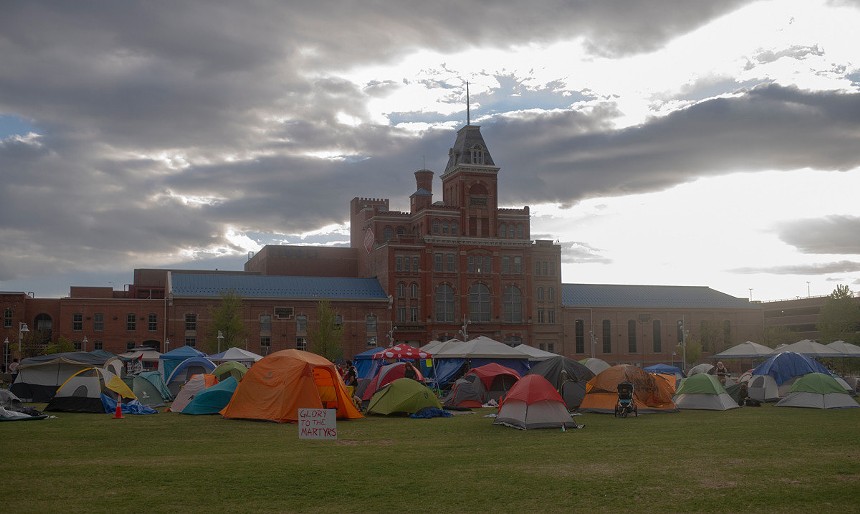
The encampment is an ecosystem complete with food and medical supplies, as well as a study tent.
Evan Semón
Auraria Campus Protest Timeline
The encampment started on April 25, but student leaders have been asking their campuses to take action since the fall semester. “In the weeks and months leading up to the April 25 demonstration, campus administrators met with student organizers of previous demonstrations to discuss concerns, understand their perspectives and explain campus policies,” says an Auraria Higher Education Center (AHEC) FAQ on the protests. However, students say those meetings never led to any action from administrators.
April 25: Protests Begin
On Thursday, April 25, protesters began gathering on the Tivoli Quad, bringing flags and signs to show their disapproval of genocide. Over time, they brought tents to form an encampment instead of holding a temporary protest.
“This is a want from the students on this campus,” CU Denver student Khalid Hamu said. “If the students on this campus have repeatedly shown that they want to see divestment from genocide, then that is something for the campus administration to implement. It is our tuition dollars that they are investing. It is our debt that they're taking so that they can go invest.”
April 26: Police Make Arrests
On Friday, April 26, Auraria officials determined that students had violated its internal camping policy, which prohibits encampments due to “health, safety and security concerns.”
“When protestors did not comply after numerous written and verbal requests, law enforcement stepped in at approximately 12:30 p.m. on Friday to remove the encampments,” a statement from AHEC reads.
The Denver Police Department assisted AHEC police in arresting 44 students on trespassing charges. The campus has repeatedly stated that it supports peaceful protest and dialogue, but not an encampment.
“We strongly condemn the use of police violence against peaceful student protesters on Friday,” Falconetti, who was one of those arrested, said at the press conference. “It's absolutely ridiculous that the university would resort to such a violent tactic, especially when the camp poses no threat to anybody. There was no violence except on the part of the police.”
According to Falconetti, police zip-tie handcuffs have left lingering numbness and bruising on their hands. “I don't know why they needed the whole DPD to enforce an Auraria campus policy,” Falconetti tells Westword.
The AHEC says arrests were only made after exhaustive efforts to engage with the protesters and describes the number of police as proportional to the need. Students disagree.
“They haven't done that for any other campus policy ever being broken,” CU Denver student Geral Mueller argued at the gathering. “People will bring food into classrooms that say 'no food' and no riot police will come and attack them, so they clearly just want to shut down this protest.”
April 26 and 27: Reestablishing Camp, Visitors and Event Cancellations
Protesters reestablished their camp quickly, and it was up and running again late on April 26. That evening, Mayor Mike Johnson visited the campus and asked participants to remove their tents — but he wasn’t the only visitor the encampment received. Activist and philosopher Angela Davis stopped by on Saturday, April 27.
“As you imagine this period being narrated ten years, twenty years, fifty years from now, you will be the historical actors who made it possible for a breakthrough in the struggle against Zionism,” Davis told those gathered. “I wanted you to know that as a person who has been involved in the movement to develop solidarity with Palestine since the 1960s, this is the moment we have all been waiting for.”
That same day, the Pancreatic Cancer Action Network canceled its PurpleStride Colorado 5k, which was supposed to take place on the Auraria campus on Sunday, April 28. The Big Stir Festival, which honors women in hospitality and was slated for April 27, was also canceled, as the university had locked down the Tivoli Turnhalle, where it was to take place.
April 29: Community College of Denver Moves Online
On Monday, April 29, the Community College of Denver, which is not officially targeted by protesters, announced it would move classes online.
April 30: Administrators and Students Meet Again
On Tuesday, April 30, AHEC CEO Colleen Walker, CU Denver Chancellor Michelle Marks and MSU Denver President Janine Davidson met with student organizers.
“CU Denver Chancellor Michelle Marks reiterated to the students that their list of demands largely sits outside of her purview, as many fall under the CU Board of Regents and President,” an AHEC statement describes.
According to Mueller, that rings hollow to students, because when they followed up by asking to meet with the regents or president, they were allegedly denied.
“If they can pull all of the [DPD] away in full riot gear to come brutalize peaceful protesters, then they can bring in the Board of Regents to draft a statement condemning genocide,” Mueller said.
There is a petition circulating advocating for Marks's removal; it was started by one of the students who was arrested.
The campus insists it supports peaceful protest but not camping, and has asked the protesters to continue engaging with school leaders. The students say they will remove the encampment immediately when their demands are met, and they have no plans to do so until then.
“They have shown us again and again that by holding our demonstrations within the confines of their rules and policies, it leads to complete inaction and dismissal,” Mueller said. “They've shown us that in order to get things done, we must engage in civil disobedience.”
May 1: Divestment Demands Extended to MSU
Students had originally only targeted the University of Colorado, but on May 1 announced that their demands extend to MSU, too. They say there is no push to add CCD at the moment, as the community college population hasn’t shown a strong interest in being involved.
Encampment Life for Students
According to Mueller, the encampment has taken steps to make sure it does not become a health and safety issue, a main point of the Auraria camping ban.“There are more than a few reasons why camping on Auraria campus is unsafe: crowd sizes can grow very quickly and impede the community’s ability to have clear walkways and the community’s ability to traverse campus easily and safely; personal hygiene and public health can become problematic quickly as the campus is not equipped with outdoor bathrooms or showers and uncollected trash and vermin can lead to illness and other unsanitary conditions,” the AHEC FAQ says.
Students have even placed two portable toilets at the edge of the quad to alleviate some of those worries. However, they say campus has threatened to take the portable toilets away.
“If they care about health and safety, they should let them stay, because otherwise we’ll have to resort to less sanitary means,” Falconetti says.
Community members steadily drop by to share supplies like doughnuts, water, extra camp chairs, medical masks and sunscreen. Students patrol to pass out water, and there’s a tent for supplies like towels, laundry detergent, toothbrushes, deodorant, paper towels, disinfectant wipes and tampons.
“We have taken care of any possible needs people have with our medical tents and food and supplies,” Mueller says. “We've even made the areas around the main tent completely wheelchair-accessible."
Students for a Democratic Society says it has organized marshals to walk around, de-escalate any potential conflicts and ensure people are safe. One student supplies music with his voice and a banjo.
“It's run by students, organized by students,” Hamu says. “It's a place of love, and it’s set up to welcome many people.”
Organizers estimate that at its peak, the encampment had up to 1,000 people, but protesters come and go to attend class or work, so the numbers are fluid. During the middle of the day, the count is much smaller than it is in the evening.
The students have set up a study tent away from the main encampment for when people need quiet and focus.
Although community members come to show their support, the organizers say the encampment is made up almost entirely of students. The students have set up a “liberation library” in honor of Refaat Alareer, a Palestinian poet who was killed in an airstrike by Israel’s military.
They also have one whiteboard laying out options for meals and another with a schedule for the day that includes teach-ins by local community organizations, DJ sets, possible group yoga and movies, STEM tutoring and quiet hours after 9 p.m.
When it isn’t quiet hours, students will sometimes chant. “Free Palestine, long live Palestine,” “Not another nickel nor another dime/No more money for Israel’s crimes,” and “Red, black, green, white, for Palestine we will fight,” are some of their refrains.
Classes will soon end for the spring, but students say they will stay even after the semester is over.
“The situation in Gaza is so urgent, as we're speaking more people are dying,” Mueller says. “For us to have this loser mentality of we can leave it at night and come back tomorrow, I see that as just giving in to the genocide. The end to a genocide can’t wait another day.”

